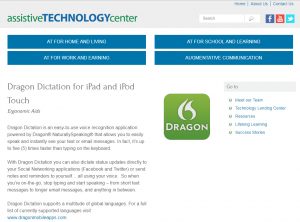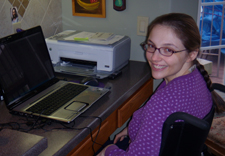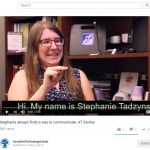
Dragons have been part of mythology for centuries. While most dragons are fearful creatures to be conquered, those of the Eastern tradition also impart wisdom and good luck. A program called Dragon NaturallySpeaking has provided a gateway for people with various disabilities to communicate independently.
Photo by Shizhao, via Wikimedia Commons
When Rita Skeeter, dressed in “acid-green” robes, asked the title character in Harry Potter and the Goblet of Fire about how he felt facing a dragon, our hero responded with a terse “Good-bye.” For centuries, Dragons have been seen as fearful beings to be defeated. John Lennon himself was open to believing in dragons until they could be disproved, saying, “Who’s to say that dreams and nightmares aren’t as real as the here and now?” That said, for an increasing number of Advancing Opportunities consumers, a computer program and app called Dragon NaturallySpeaking is a dream come true… and independence.

Dragon Dictation offers quick voice-command communication in person and online. New Jersey residents can try the software out on the iPad, for free.
With Dragon NaturallySpeaking, the user simply speaks into any application that accepts text, iOS, Windows, or online, along with Dragon mobile apps, and the speech is transcribed to text. The program also stores customized voice commands for writing, surfing the Web, checking e-mail, and updating a calendar. Residents of New Jersey can try out Dragon Dictation for iPad and iPod Touch for free. This app, powered by Dragon NaturallySpeaking, allows for quick spoken communication and the for user to compose and read e-mail messages more than five times faster than by using a keyboard. Live and social media conversation have never been faster or more convenient.
Proven Success as Assistive Technology
Previously, we discussed how Stephanie T., a deaf woman, uses Dragon NaturallySpeaking to help her communicate independently. The software is among those products (among them the Amazon Echo) marketed to the general consumer that have found an important niche as a form of assistive technology for people with disabilities. Indeed, Dragon NaturallySpeaking is an example of productivity software that provides the perfect solution for someone who, because of a physical disability, is unable to type.

With Dragon NaturallySpeaking, Melissa could complete here college assignments much more easily.
For Melissa, a college student majoring in social work, typing was an arduous task. Attending classes, completing assignments, studying, and getting organized were for her overwhelming. To help Melissa complete the many longer writing assignments, the Assistive Technology Services team recommended a voice-recognition program called Dragon NaturallySpeaking, from Nuance. For Melissa, learning this powerful software took time but, in the end, the program has saved her hours of typing, sharply reducing the fatigue she experienced previously.

Kelly has found increased independence as a college student.
And for Kelly, another college student, Dragon NaturallySpeaking works in conjunction with her Kurzweil 3000 AAC device, allowing her to participate fully in academic and social activities.
For all three women with widely differing disabilities, using Dragon NaturallySpeaking as an assistive technology tool has gone a long way in increasing their independence.


